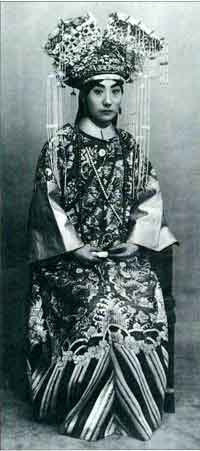|
Wang Yaoqing (Peking opera)
Wang Yaoqing[b] (28 December 1881 – 3 June 1954) was a Chinese actor and singer noted for playing the role of a virtuous adult woman, or qingyi,[c] the most important role in Peking opera. He was from Qingjiangpu District, Huai'an in eastern Jiangsu Province.[1] Wang was noted for his skills as a long-sleeved dancer, for sword dancing, and for his portrayal of a stylish Manchu lady. He was president of the National Academy of Chinese Theater Arts from 1951 to 1954. He taught many other actors, including Mei Lanfang, the best-known singer of the genre.[2] BiographyWang's father, Wang Xuanyun,[d] was an actor in Kun Opera.[3] He died when Yaoqing was 10. Yaoqing learned female impersonation from Tian Baolin.[e][4] In 1894, Wang performed in The Pagoda,[f] his first play. In 1896, the Cheng Troupe was formed with Wang as a member.[5] In 1897, he married the daughter of Yang Duoxian.[g] His acting troupe disbanded during the Boxer Rebellion of 1900. Afterwards, he joined the Fushou Troupe.[4] In 1904, Wang was summoned to the palace and asked to set lyrics written by Empress Dowager Cixi to music. He was awarded thirty taels for this.[3] Wang registered to play for the imperial household. His role as a Manchu lady in Incident at Fen River Bend[h] was appreciated by Cixi. He joined the Tongqing Troupe in 1905. With partner Tan Xinpei, Wang introduced various innovations to the qingyi role, including a greater range of facial expression and stylized body movement.[6][4] Wang's other notable roles include Fourth Son Visits His Mother,[i] The Wujia Slope,[j] Nantian Gate,[k][6] Goose Gate Pass, Mulan Joins the Army, Story of a White Snake, and Story of Willow Shade.[7] Wang's voice deteriorated early. His last performance was in 1926 in Shanghai.[8] In the 1930s, he was a teacher at the Chinese Opera Academy.[l] This school was disbanded in 1941. Wang was also a noted theater critic. He came up a set of four characters to describe the "four great dan." (A dan is a female impersonator.)[9] Wang served as president of the National Academy of Chinese Theater Arts, which was established in 1950. He died in 1954.[4] More than sixty of Wang's manuscripts were left at Gumei Studio, his residence. He often collaborated with Chen Moxiang. Wang would set Chen's lyrics to music.[3] A sound recording series of his work aimed at schoolchildren entitled Wang Yaoqing Talks about Opera was released in 1961.[10] In 2016, there was a concert at the Great Hall of the People in Beijing to honor Wang's 135th birthday.[11] NotesReferences
External links
Further reading
|
||||||||||||||||||
